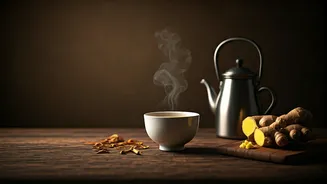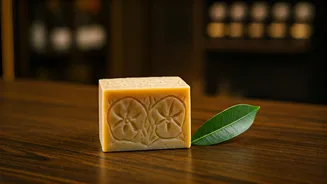Choosing Your Ginger
The quality of your ginger significantly impacts the taste of your tea. Fresh ginger is always the superior choice, as it offers a robust and spicy flavor
that dried ginger simply cannot match. Look for ginger roots that are firm to the touch and have smooth, unblemished skin. Avoid ginger that appears shriveled or has soft spots, as these are signs of age or spoilage. The amount of ginger to use depends on personal preference and how strong you like your tea. A general guideline is to use about a one-inch piece of ginger per cup of tea, but feel free to adjust this to your liking. When it comes to the preparation of the ginger itself, there's a common debate: should it be grated or crushed? Both methods have their merits. Grating the ginger releases more of its essential oils, leading to a more intense flavor. Crushing the ginger, on the other hand, can be quicker and easier, especially if you have a garlic press or a mortar and pestle. Ultimately, the best method depends on your personal preference and the equipment you have available.
Grated vs. Crushed
Both grating and crushing ginger provide unique advantages in tea preparation. Grating the ginger finely exposes a greater surface area, which extracts more of the ginger's potent compounds. This method often results in a spicier and more aromatic tea. If you choose to grate the ginger, use a fine grater to achieve the best results. A fine grate allows the ginger to infuse into the water more efficiently. Crushing ginger is a simpler and quicker approach. Using a mortar and pestle, or even the side of a knife, to crush the ginger releases its flavors, although perhaps not as intensely as grating. If you lack a grater or are in a hurry, crushing is a practical alternative. The decision to grate or crush also influences the brewing process. Grated ginger tends to infuse faster, potentially requiring a shorter steeping time. Crushed ginger may need a slightly longer steeping duration to release its full flavor profile. Regardless of the method chosen, ensure the ginger is well incorporated into the water during the brewing process to maximize flavor extraction.
Brewing Your Chai
Once you've prepared the ginger, it's time to brew your tea. Start by boiling water in a saucepan. For a single cup of tea, approximately one cup of water is sufficient. Once the water reaches a rolling boil, add the ginger. If you're using grated ginger, simmer for about 3-5 minutes. If you're using crushed ginger, you might want to simmer for a few minutes longer, perhaps 5-7 minutes, to allow the flavors to fully develop. After simmering the ginger, add the tea leaves. Black tea is the most common choice for ginger tea, and Assam tea is a popular option because of its bold flavor. However, you can experiment with other types of tea, such as green tea or even herbal teas, for a different taste. Let the tea leaves steep for about 2-3 minutes, or according to your preference for strength. The longer the tea steeps, the stronger it will be. Next, add milk. Use your preferred type of milk, whether it is dairy milk, or a plant-based alternative. Sweeten the tea with sugar or your favorite sweetener. Once the tea has been brewed to your liking, strain it into a cup. You can use a fine-mesh strainer to remove any ginger or tea leaves. Finally, enjoy your freshly made ginger tea. The brewing method, from ginger preparation to the steeping time, provides you with the power to craft your perfect cup.
Achieving the Strength
The desired strength of your ginger tea is a matter of personal preference. Several factors influence how strong the tea turns out. The amount of ginger used is a critical factor. The more ginger you use, the stronger the tea will be. You can adjust the amount based on your preference for a mild or a more intensely spiced flavor. Similarly, the simmering time affects the strength of the tea. Longer simmering allows the ginger's flavor compounds to fully release into the water. Therefore, simmer for a longer period if you prefer a stronger tea. The type of ginger can also influence the strength. Fresh ginger generally offers a more potent flavor compared to dried ginger, which may be less intense. When steeping, the type and quantity of tea leaves are also important. Stronger black teas, like Assam, will complement the ginger's flavor, but ensure that the tea is not too overpowering. The amount of tea leaves used can affect the final taste, from delicate to bold. Taste your tea during brewing and adjust these factors to achieve your ideal strength. This way, the taste is always tailored to your personal tastes.













